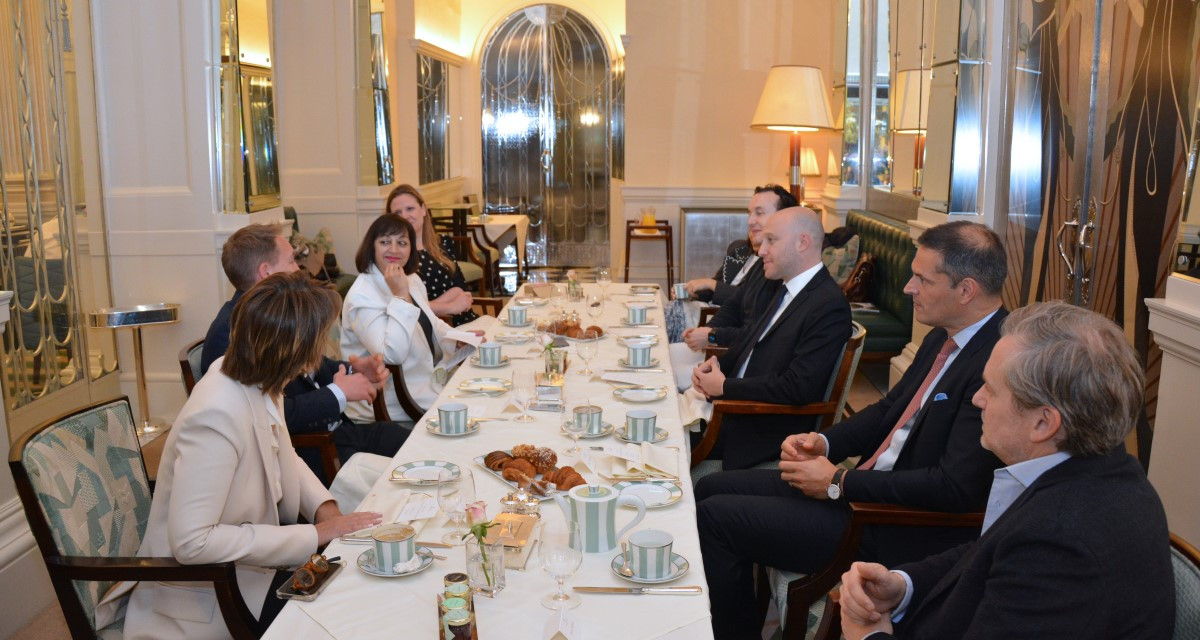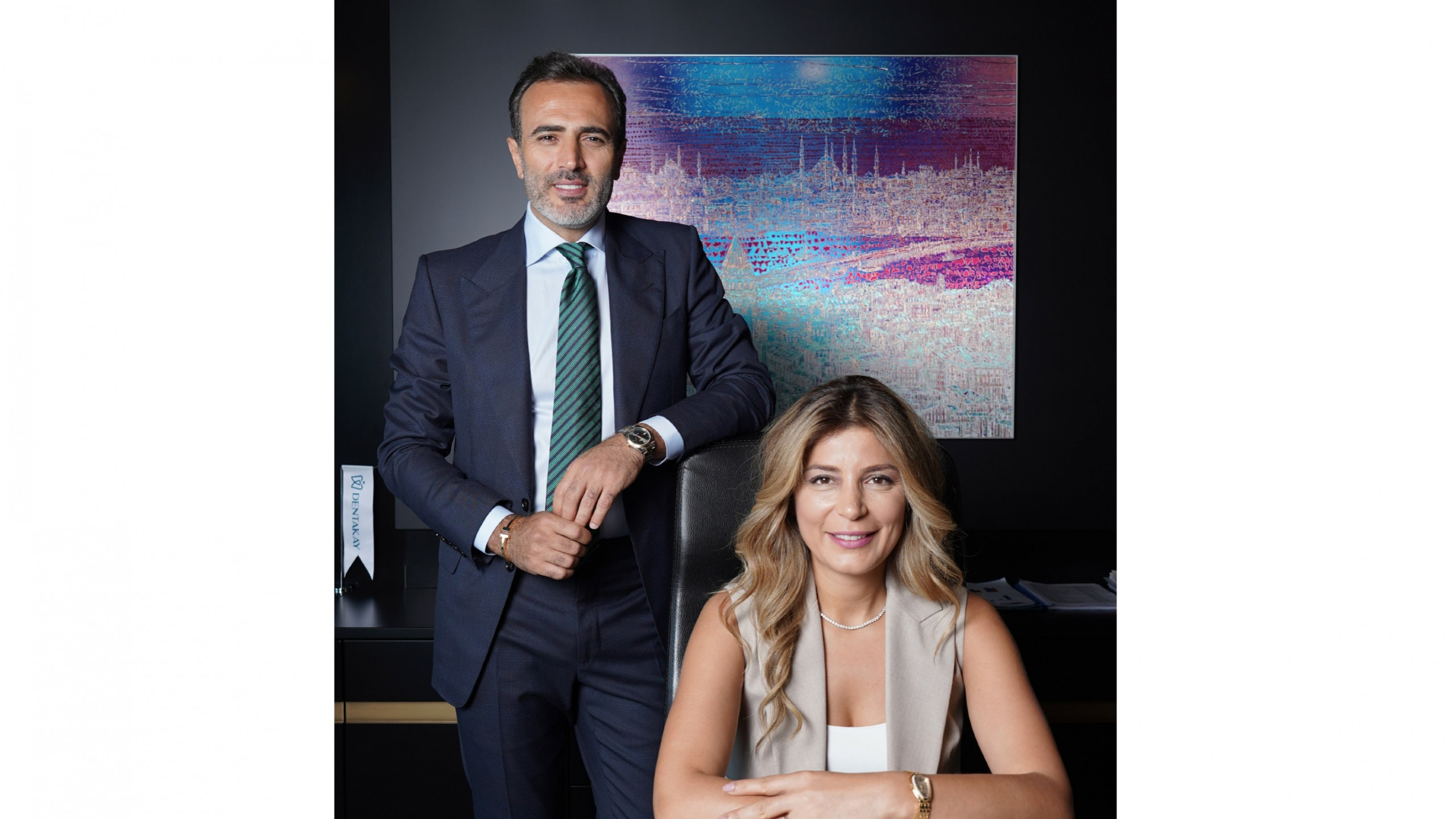One of the long-lasting effects of the pandemic is our changed attitude towards mental and physical wellness, which has moved to the very top of our agendas. Mayfair Times met with a group of industry experts over breakfast at Claridge’s to discuss this shifted landscape
POST-PANDEMIC TRENDS
Jonathan
During the pandemic, people realised how fragile they are – it really changed the mindset and people became more proactive in managing their care. We also saw during the pandemic a steep decline in the diagnosis of cancer, for example, and other issues because people weren’t going to the doctor, so that also raised awareness. One of the major trends we’ve seen is that people are realising they can get support through various digital tools to help them in accessing care and getting consultations.
Ruth
We saw a big jump in membership due to the fact that, during Covid, while everything shut down and most people didn’t have the access, we made sure that we still had the capability to provide the access and that things could continue as normal as possible for our members.
Brett
People now want a level of care that really carries through –that’s what people are looking for now. A lot of our residents are 65 plus but only 30 per cent of them actually have an immediate medical care need so, among all the luxury, we put together an amazing wellness offering. We work with the Kyros Project [a team of experts in fitness, nutrition and physiology] so if somebody has specific nutrition needs, they can liaise with our head chefs to get what they want. So, it’s a lot more than just water aerobics at 11 o’clock in the morning. For us, it’s all about individuality.
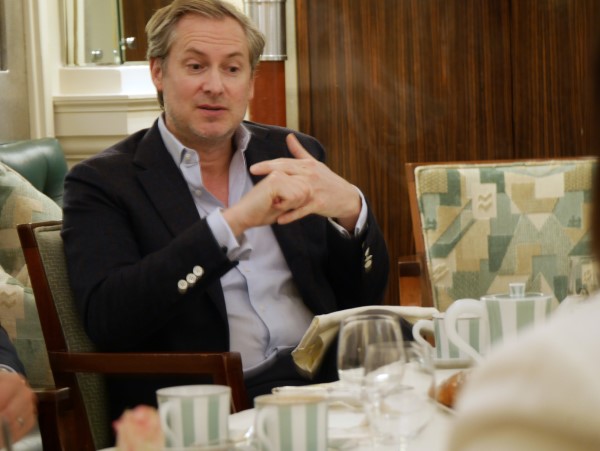
David
The big thing that I’ve seen in my clinic is that people want more bio stimulation-type treatments, things that are going to prolong the life of their skin, which might not give the immediate gratification of other treatments. People are also engaging more with supplements – they’re taking things to help them sleep and with relaxation. And that’s something that really has come post pandemic, I would say. They are thinking about how their skin actually works a lot more, and how they can treat it with lifestyle, too. So it’s been quite an interesting shift.
Mario
Hopefully, people are taking steps now to look after themselves just that little bit more. We try to take a holistic view about prevention when possible but, at the same time, we try to navigate all the different services we offer to help our members – so it’s a personalised approach. The course of action that we propose is based on personal data and results.
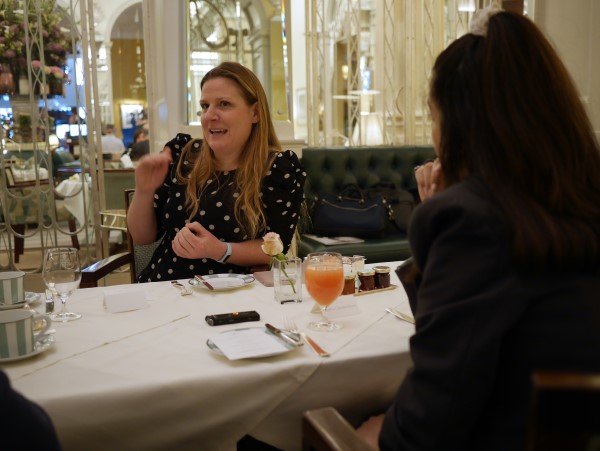
Chantelle
As an employer, mental health has been my number-one priority. So when opening the restaurant, there were some deal breakers that I wouldn’t budge on, such as opening only five days a week versus seven. We found when the curfew was in place, when we had to vacate the premises by 10pm, it actually had a really positive impact on the team because they were off home early and they could get public transport home. And we have trained mental health first aiders who look at the wellness of the team. So it’s not just focusing on the guests because, without the team, we can’t welcome the guests.
PREVENTATIVE CARE AND EDUCATION
Mario
I think people understand now that it’s about investing in their future self as opposed to just the cost of a gym membership. The health and fitness industry has evolved now to embrace the medical aspects of wellbeing, and there’s more education and more understanding of that.
David
The interest has been slowly increasing over the past 20 years, but there was a real spike in knowledge and awareness during the pandemic. People were spending more time on social media, learning about their skin and their health generally. We saw a huge boom in patient numbers.
Ruth
Still many people lack medical awareness – they have no clue what’s happening. Doctors treat you completely differently when you are medically savvy than when you’re not, and it can make a difference as to whether you survive or not. And that is a big issue. I would say people are more vulnerable here than in places like France, Germany, Switzerland or Israel, where the general medicine is much better. I think the pandemic created awareness that if people looked after their preventative health care, they would be in a better boat.
Simon
Why has everyone only just woken up now and realised that you need to be proactive all the time about staying ahead of things?
David
I think on a mass scale, it’s very difficult [to educate] because at the high end of the market where people have money and time, interest in these things is much easier. But how that filters down to a much broader audience is the real challenge.
Chantelle
From the nutrition side, I do think people are a bit more informed now and it’s having that subconscious trust that, actually, what they are putting in the body has been sourced really well as opposed to just going out and having something from a nondescript source. Knowing that they are front and centre of your thoughts. I think, for me, it’s that fine line between being dictatorial about it and being virtuous – it’s more, “this is what we do. This is how we do it. This is why we do it. If you’d like to know more, there is more”. But dining out should be a joyful experience and if you just want to come and eat and have a great experience, that’s fine. We also have a low intervention wine list so, again, people know what they are putting in their bodies. It’s about being mindful across the board with everything – just being more conscious of what you’re doing and the effect it has on your health.
Simon
But there is just so much more available to people now. If you have access to the internet and you’re curious, you can find out so much more and take control now more than ever before. I think a lot of people aren’t proactive enough.
Ruth
I agree – it’s good to be informed. But it’s also a fine line between being well informed and self-diagnosis because when you try and do that, you may end up jumping off a cliff. So it’s not always a good thing.
David
I think a lot of people who do their own research are quite misinformed. With aesthetics, it’s simple stuff, but in surgery, which is what my background is, people would come in with very strange ideas and it would take a while to convince them otherwise. I used to work in Chelsea and Westminster and we used to see lots of people who would go to Turkey and have horrendous procedures done at really low prices.
Mario
You must see this a lot. How do you deal with people saying, “If I have this procedure done, then I’ll be happy”. And then, of course, they’re not. It might not be about whatever feature they want to correct – it might actually be something deeper than that.
David
It’s usually quite obvious when people come in and it’s a real red flag not to treat. It’s very difficult to deal with because people have such high expectations; they’re wanting to do something and to then say no to them, it’s quite traumatic as well. But as a responsible practitioner, you just can’t treat people who are in that mindset, because it will just open up a can of worms.
HEALTHCARE
Mario
It’s all well and good being obsessed with prevention, but happiness – we can’t measure it. And being happy is surely the main driver of quality of life in your later years. Brett, you are obviously focusing on that?
Brett
Yes. And what’s really interesting is that one in six of the UK population is over 65 at the moment. By 2050 it is going to be one in four. That’s nearly 20 million people. And I think, as a country, we’re not quite prepared for that. Look at Canada or Australia – they are a lot further ahead.
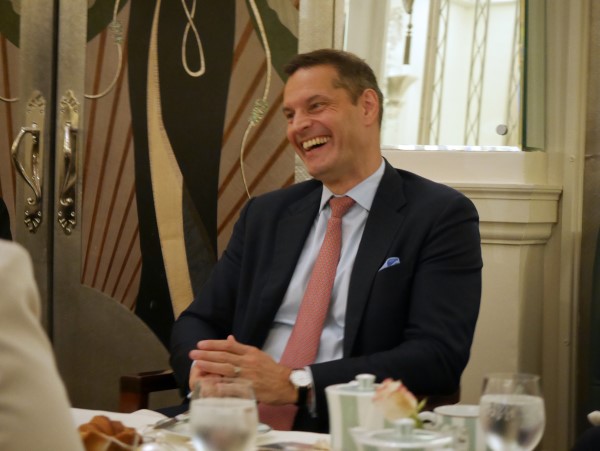
Ruth
In the US, this is a much bigger, much more mature market than in the UK or in Europe. They have old-age homes with all sorts of facilities. I think the UK is lagging behind generally, although the private sector – from my own personal experience – I would say is fantastic. But you have to know where to go and this is a problem. I would say, in general, people are not well taken care of.
David
I definitely agree. I think a lot of it comes from years of the NHS being there as a safety blanket for people so they don’t really need to proactively think about things – they don’t really need to think about how to look after themselves because there will always be something there that they don’t need to pay for. There’s not the same kind of ownership over your own health as there is in Switzerland or other places, where it’s predominantly private medicine. Whereas in the UK, you just go to your GP if you’ve got a problem and they tell you what you need to know. And that’s it. So I think it has to come from the NHS but how that’s done with limited budgets, I have no idea.
Jonathan
I don’t think it’s the doctors’ fault. They’re very, very burdened and don’t have enough time. The average GP, depending on which country, has between two and seven minutes to see a patient. And that’s one of the challenges. We employ 300 doctors in-house and a network of over 4,500 specialists that we consult with globally. And it’s very important to have doctors who put the patient in the centre and engage with them. We’re also in a transition period. If you look at doctors who are now in their 60s, they were educated in different ways; the way that they engaged with patients was different.
We are seeing more inclusive care experiences now. And that’s what we try to provide.
David
From a medical education point of view, with GP training, in particular, in the UK, it’s so short, and there’s so little exposure to subspecialties so GPs in this country have a very general experience. It’s been shrunk down so much because they just want GPs there to fill the service.
HEALTH, WEALTH AND WELLNESS
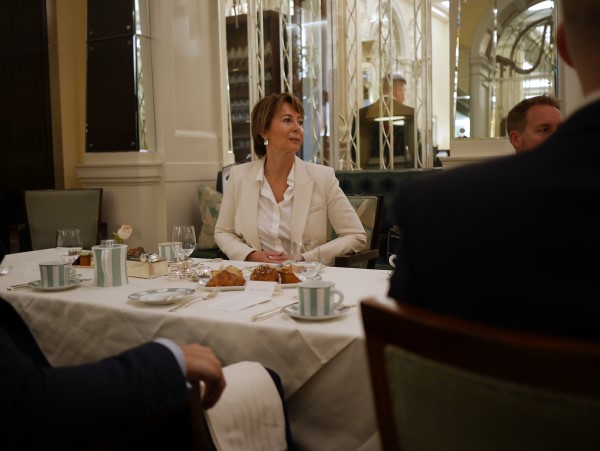
Ruth
Good health care is a luxury – it’s a privilege. But it’s not enough to be wealthy – you have to be smart enough to address it because some people who are very wealthy don’t address the issue. Wellness is a spectrum. What I see from our clients is that you feel good in yourself, you feel fit to a certain extent and you are happy, not only with the way you look – it is more the way you feel and you are at ease or at peace. If you encounter a medical problem or an issue then you know where to go, who to address, who is going to help you. A lot of people have fear – when something happens, they don’t know where to go or how to do it.
So wellness is an accumulation of different aspects – it’s not a one-directional thing. Going to the gym is not enough. Because, as we all know, things happen and things happen to younger people as well.
Mario
Wellness does not require wealth. Living well does not require wealth and there are people within our networks who have wealth beyond our wildest dreams, but they are not necessarily happy and they are not necessarily living a better life than us and are not necessarily addressing it. Yes, it is how you eat, it is how you sleep, it is how you move and it’s being receptive to all of those things but it’s your immediate community, your sense of family, your sense of worth that is driven by your loved ones around you, friends, family and so on. So wellness is multi-faceted but it doesn’t require wealth. In some cases, wealth is a burden and creates its own stress.
Simon
I think actually the wealthier you get the more you worry. Everybody has certain worries, whether it’s jobs, relationships, money or whatever, but when those things are sorted you are going to move towards worrying about your health and with billionaires, the one thing they can’t control is a pandemic. It’s the one thing they can’t do anything about.
Ruth
It feels as if the luxury market has no limits to what people feel they can achieve and what they want. Luxury holidays are not good enough any more; they have to have the best chef; it has to be the best home; and the air has to be clean. The wealthier became much more wealthy during the pandemic and, because of social media, it’s a lot more visible.
Brett
I’m sure you must see that with aesthetics as well David?
David
Yeah, for sure. People want more and more and want to do the next best thing. It’s good for business and good for misinformation as well. But generally, it’s been a big driver.
Mario
As a parent, I worry about social media. Instagram has a lot to answer for – we see how the wealthy live, we see how people wish to portray their lives, which is not their reality, but unfortunately, particularly younger people, aspire to that and think, “my life is rubbish – I want that life”. And that leaves a mental health issue right there, which probably leads to your door David and also to ours as well. We are seeing that a lot.
TECHNOLOGY
Simon
I’d say the biggest thing right now are wearables, so people are thinking about health on a day-to-day basis rather than just treating symptoms. DNA, home kit testing, smart sensors – all these things are here and they’re advancing with things like Silicon Photonics. The Apple Watch, the next versions will be much more advanced, giving people clinic-on-the wrist stuff. So it’s people being more mindful about their health more plus tech making it a bit easier.
Jonathan
We are in a transition period in that sense. I look at my children – they’re eight, five and two. And when I see the way that they engage with tablets and smartphones, it’s very different to the way that I grew up. And I think that my children or their children, the way they approach and use technology to enhance the way they manage their care will be very different.
Brett
With our residents, yes we use technology, for example, Kyros is bringing cellular health testing, but it’s a softly, softly approach. Some of them are interested in the details of cellular health and their stress levels and others just want to play tennis and play piano. It’s actually being able to do what they enjoy. So it’s not so much about the process – it’s about the outcome.
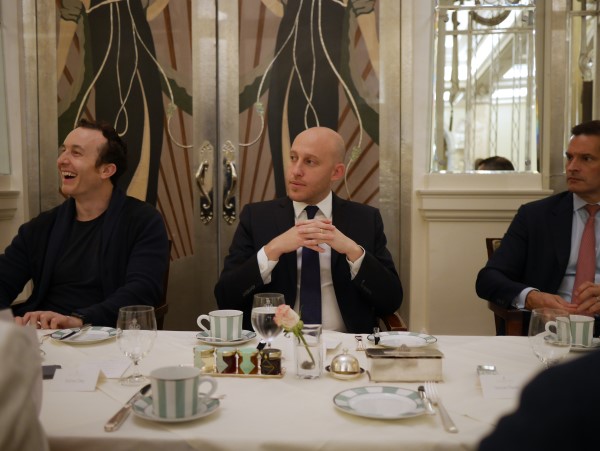
Mario
Technology has helped massively in making everything more accessible. And there’s a trickledown effect. We’ve seen that with the gym business. Twenty years ago, health clubs were the privilege of the wealthy but with the advent of technology, the budget market is growing, making it more affordable for everybody. If you look at the equipment now at Pure Gym and so on, it’s hard to distinguish between them and a premium offering. The difference is the personalised service.
Jonathan
We also see that on the medical side – digital tools are increasing accessibility. There still needs to be a human element but we’ll see the point of entry to care change and the dynamics between the doctor and the patient. We’re seeing digital therapeutics – doctors prescribing apps instead of tablets. It’s a transition phase and technology will play a greater role. We’ll see more in five years – it will be exponential.
Simon
The smartphone is the game changer but it will be the accessories that come with it. And then biotech – the ability to really personalise medicine. The speed of drug discovery is another one. Look at the pandemic and the way they got the vaccine out – it was majorly AI driven. A lot of people in biotech are convinced that you just need to stay healthy for 10 years then the next 20 years after that will be slightly easier with drugs changing and awareness.
COMMUNITY AND SOCIAL INTERACTION
David
I think in cities where there is generally such disconnect and people live such busy and frenetic lives, they are hopefully starting to realise the importance of community – it is something that they have realised that they need and they desire, following the pandemic.
Brett
The sense of community is a big draw for our residents. We have one lady who moved in who had been in a mansion block and, during lockdown, everyone else in the block had gone. She was the only one and she was miserable. And she came to a Bridge drive that we did and moved in two months later. She thrived. Another says her relationship with her granddaughter has improved. She picks her up from school on a Monday, they come and have a swim, order room service, the girl does her homework and she says, mentally, that’s helped improve her quality of life – something as simple as that.
Chantelle
I think people are also now looking for more experiences. During the lockdowns, they were so deprived of social interaction and having someone cook for them, that when lockdowns were released, people were just rushing to get back to restaurants.
Simon
Loneliness is the biggest killer.
Ruth
It’s a very big issue – you could see during the pandemic with the elderly and the young who were alone. If there hadn’t been Zoom during the pandemic, people would have had no connection to anybody.
Jonathan
Telehealth has been around for 15 years but, during the pandemic, we saw a boom. And there’s a lot of discussion on the meta verse and, clearly, it is of interest to a lot of people who feel they can lead certain portions of their life in a parallel world. But at Medix, we believe it’s still very important to have that human touch. So I don’t think that apps and AI will completely replace doctors or clinics – you still have to have that human touch at the end.
PARTICIPANTS
Jonathan Sternberg, Chief Strategy and Business Officer, Medix Global, a leading global provider of innovative, highquality health management solutions
Simon Pavitt, COO of London Technology Club, an exclusive club for investors and tech professionals
Dr David Jack, a leading Harley Street-based aesthetic doctor who has created his own skincare brand
Selma Day, Editor, Mayfair Times
Brett Perkins, Chief Marketing Officer, Auriens Chelsea, which offers luxury retirement living
Mario Pederzolli, CEO of Lanserhof at The Arts Club, a leading private wellness clinic that offers state-of-the-art medicine and hi-tech diagnostics
Chantelle Nicholson, chef/owner of Apricity, a sustainable and zero-waste restaurant in Duke Street focusing on veg-forward cooking and planet-friendly practices
Ruth Cohen, VIP Customer Director at Medix ONE, an exclusive global health management services private members’ club
Sophia Charalambous, Health and Beauty Editor, Mayfair Times

